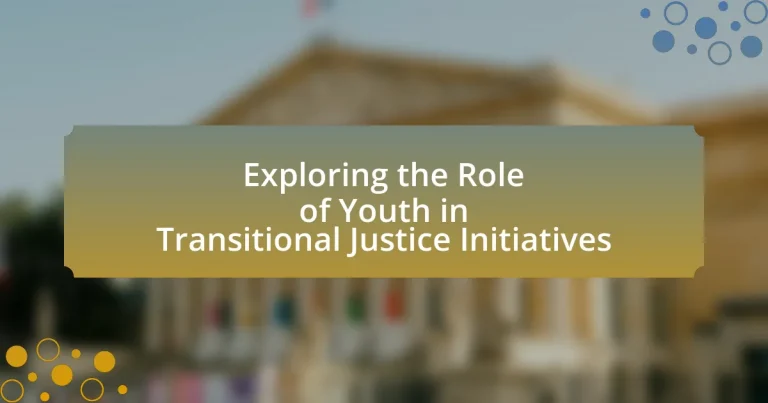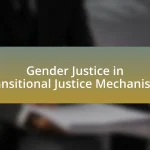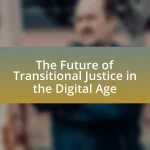The article explores the significant role of youth in transitional justice initiatives, highlighting their capacity as agents of change and advocates for accountability and reconciliation. It discusses the importance of youth involvement in ensuring inclusivity and representation of younger generations in processes addressing past injustices, as well as the unique perspectives they bring to these initiatives. The article also examines historical contexts of youth engagement, the challenges they face, and best practices for enhancing their participation, including the use of technology and mentorship programs. Overall, it emphasizes the critical contributions of youth to fostering long-term stability and reconciliation in post-conflict societies.
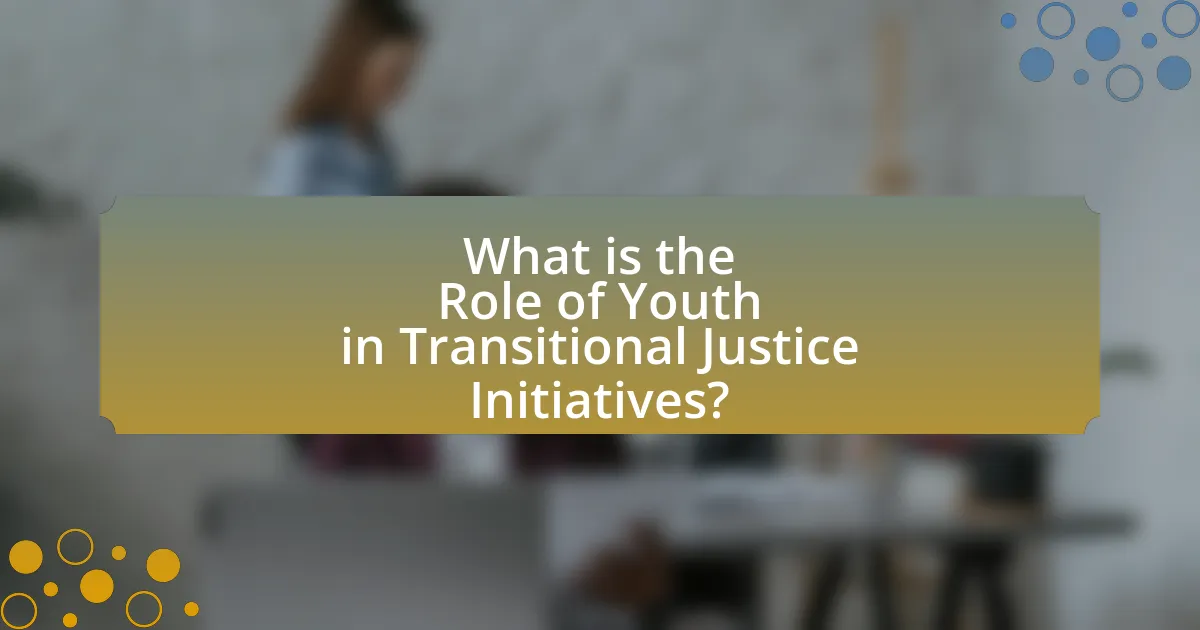
What is the Role of Youth in Transitional Justice Initiatives?
Youth play a crucial role in transitional justice initiatives by acting as agents of change and advocates for accountability and reconciliation. Their involvement is essential for ensuring that the perspectives and needs of younger generations are represented in processes aimed at addressing past injustices. Research indicates that youth engagement can enhance the legitimacy and effectiveness of transitional justice mechanisms, as seen in various contexts where young people have mobilized for truth commissions and reparations programs. For instance, in countries like South Africa and Colombia, youth-led movements have significantly influenced policy decisions and public discourse surrounding justice and healing.
Why is youth involvement crucial in transitional justice processes?
Youth involvement is crucial in transitional justice processes because it fosters inclusivity and ensures that the perspectives of younger generations are represented in shaping post-conflict societies. Engaging youth allows for the incorporation of innovative ideas and approaches that can address the unique challenges faced by younger populations, such as education, employment, and social integration. Furthermore, studies have shown that when youth participate in transitional justice, it enhances the legitimacy and effectiveness of the processes, as evidenced by the United Nations Security Council Resolution 2250, which emphasizes the importance of youth in peace and security initiatives. This involvement not only empowers young people but also contributes to long-term stability and reconciliation in societies recovering from conflict.
What unique perspectives do young people bring to transitional justice?
Young people bring fresh and innovative perspectives to transitional justice by emphasizing the importance of inclusivity, social media engagement, and a focus on future-oriented solutions. Their unique experiences often reflect a desire for accountability and reconciliation that resonates with their peers, fostering a collective memory that prioritizes healing over retribution. For instance, studies show that youth-led initiatives often utilize social media platforms to amplify marginalized voices and mobilize communities, effectively bridging generational gaps in understanding justice. This engagement not only enhances participation but also ensures that transitional justice processes are relevant to younger generations, as evidenced by the involvement of youth in movements like the Arab Spring, which highlighted the demand for justice and reform.
How does youth participation influence the outcomes of transitional justice initiatives?
Youth participation significantly enhances the outcomes of transitional justice initiatives by fostering inclusivity and ensuring that diverse perspectives are represented. Engaging young people in these processes can lead to more innovative solutions and a greater sense of ownership over the justice mechanisms. For instance, research conducted by the United Nations Development Programme highlights that youth involvement can improve the legitimacy and effectiveness of transitional justice efforts, as young individuals often bring fresh ideas and a commitment to social change. Additionally, their participation can help bridge generational divides, facilitating dialogue and reconciliation within communities affected by conflict.
What are the historical contexts of youth engagement in transitional justice?
Youth engagement in transitional justice has historically been influenced by various socio-political contexts, particularly during periods of conflict and post-conflict reconstruction. For instance, in the aftermath of the Rwandan Genocide in 1994, youth were mobilized to participate in reconciliation efforts, highlighting their potential as agents of change in rebuilding society. Similarly, during the Arab Spring, young activists played a crucial role in advocating for justice and accountability in countries like Tunisia and Egypt, demonstrating their capacity to influence political transitions. These historical instances underscore the importance of youth as vital stakeholders in transitional justice processes, as they often bring fresh perspectives and energy to initiatives aimed at addressing past atrocities and fostering societal healing.
How have past transitional justice initiatives included youth?
Past transitional justice initiatives have included youth by actively engaging them in processes such as truth commissions, reparations programs, and community dialogues. For instance, in South Africa, the Truth and Reconciliation Commission involved youth through educational outreach programs that encouraged their participation in discussions about the past and their role in shaping the future. Additionally, in countries like Sierra Leone, youth were included in the design and implementation of reparations programs, ensuring that their voices were heard in addressing the impacts of conflict. These initiatives recognized the importance of youth as agents of change and sought to empower them in rebuilding their societies post-conflict.
What lessons can be learned from historical youth involvement in these processes?
Historical youth involvement in transitional justice initiatives demonstrates the significant impact of youth activism on social change and policy reform. Youth have often been at the forefront of movements advocating for justice, accountability, and reconciliation, as seen in the role of young people during the Truth and Reconciliation Commission in South Africa, where their testimonies highlighted the need for restorative justice. Additionally, the Arab Spring illustrated how youth mobilization can challenge oppressive regimes and demand democratic reforms, emphasizing the power of social media in organizing and amplifying their voices. These examples underscore that youth engagement can drive transformative processes, influence public discourse, and foster a culture of accountability in post-conflict societies.
What challenges do youth face in participating in transitional justice initiatives?
Youth face several challenges in participating in transitional justice initiatives, including lack of representation, limited access to resources, and social stigma. These challenges hinder their ability to engage meaningfully in processes aimed at addressing past injustices. For instance, youth often find themselves underrepresented in decision-making bodies, which can lead to their perspectives being overlooked. Additionally, many young individuals lack the financial and educational resources necessary to participate effectively, as highlighted by studies indicating that marginalized youth are less likely to be involved in civic activities. Social stigma surrounding their age can also lead to perceptions that their contributions are less valuable, further discouraging their involvement.
What barriers limit youth engagement in these processes?
Barriers that limit youth engagement in transitional justice processes include lack of access to information, insufficient representation in decision-making, and socio-economic challenges. Youth often face difficulties in obtaining relevant information about transitional justice initiatives, which hinders their ability to participate effectively. Additionally, their underrepresentation in leadership roles and decision-making bodies means their perspectives and needs are frequently overlooked. Socio-economic factors, such as poverty and unemployment, further restrict youth from engaging in these processes, as they may prioritize immediate survival over participation in justice initiatives. These barriers collectively diminish the potential contributions of youth to transitional justice efforts.
How can these challenges be addressed to enhance youth participation?
To enhance youth participation in transitional justice initiatives, it is essential to implement targeted educational programs that raise awareness about the importance of youth involvement. Research indicates that when young people are educated about their rights and the impact of transitional justice, their engagement increases significantly. For instance, a study by the United Nations Development Programme found that youth who participated in workshops on transitional justice were 40% more likely to engage in related activities. Additionally, creating platforms for youth to voice their opinions and contribute to decision-making processes can further empower them. Evidence from various youth-led organizations shows that inclusive dialogue fosters a sense of ownership and responsibility among young participants, leading to higher levels of active involvement.
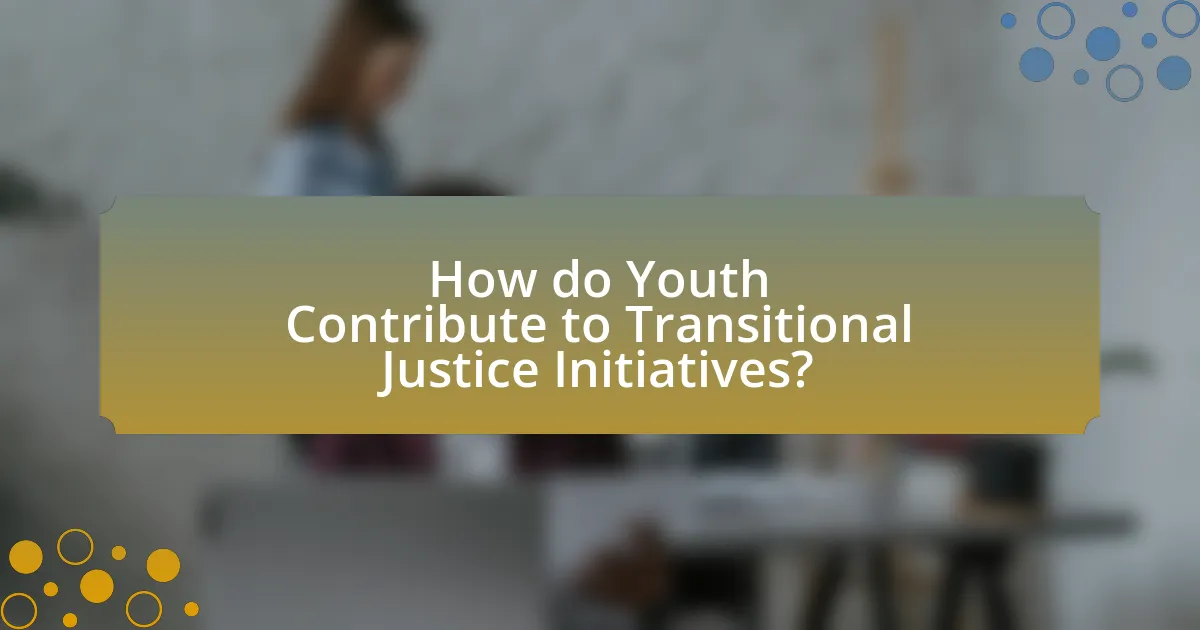
How do Youth Contribute to Transitional Justice Initiatives?
Youth contribute to transitional justice initiatives by actively participating in advocacy, promoting accountability, and fostering dialogue within their communities. Their involvement often includes organizing grassroots movements, engaging in peacebuilding activities, and utilizing social media platforms to raise awareness about injustices. For instance, youth-led organizations have been pivotal in mobilizing support for truth commissions and reparations programs in various countries, such as South Africa and Colombia, where young activists have played crucial roles in shaping public discourse and influencing policy decisions. This engagement not only empowers youth but also ensures that their perspectives and experiences are integrated into the transitional justice processes, thereby enhancing the legitimacy and effectiveness of these initiatives.
What roles do young people play in transitional justice initiatives?
Young people play crucial roles in transitional justice initiatives by acting as advocates, participants, and leaders in processes aimed at addressing past injustices. Their involvement often includes raising awareness about human rights violations, contributing to truth-telling efforts, and promoting reconciliation within their communities. For instance, youth-led organizations have been instrumental in mobilizing communities to engage in dialogue and healing processes, as seen in countries like South Africa and Rwanda, where young activists have significantly influenced public discourse on justice and accountability. Additionally, research indicates that youth engagement in transitional justice can enhance the legitimacy and effectiveness of these initiatives, as their perspectives often reflect the aspirations and needs of future generations.
How do youth act as advocates for justice and accountability?
Youth act as advocates for justice and accountability by engaging in activism, raising awareness, and participating in policy-making processes. They utilize social media platforms to mobilize support, share information, and amplify marginalized voices, which has been evidenced by movements like Black Lives Matter, where young activists played a crucial role in advocating for systemic change. Additionally, youth often participate in community organizing and grassroots campaigns, demonstrating their commitment to holding institutions accountable for injustices. Research from the United Nations indicates that youth involvement in transitional justice initiatives can lead to more inclusive and effective outcomes, as their perspectives often challenge traditional narratives and promote innovative solutions.
In what ways do young people engage in community rebuilding efforts?
Young people engage in community rebuilding efforts through volunteering, advocacy, and participation in local governance. They often volunteer in initiatives such as neighborhood clean-ups, food drives, and community gardens, which directly contribute to improving local environments and fostering community spirit. Additionally, youth advocate for policy changes that address social issues, leveraging social media platforms to raise awareness and mobilize support. Their involvement in local governance, such as attending town hall meetings or serving on youth councils, allows them to influence decision-making processes that affect their communities. Research indicates that youth participation in these activities not only enhances community resilience but also empowers young individuals by giving them a voice in shaping their environments.
What skills and capacities do youth develop through their involvement?
Youth develop critical skills and capacities such as leadership, communication, and problem-solving through their involvement in transitional justice initiatives. These skills are cultivated as they engage in dialogue, collaborate with diverse groups, and contribute to community rebuilding efforts. Research indicates that youth participation enhances their ability to advocate for justice and fosters a sense of agency, which is essential for effective civic engagement. For instance, a study by the United Nations Development Programme highlights that youth involved in such initiatives report increased confidence and improved negotiation skills, demonstrating the tangible benefits of their active participation.
How does participation in transitional justice initiatives empower youth?
Participation in transitional justice initiatives empowers youth by providing them with a platform to voice their experiences and influence societal change. Engaging in these initiatives allows young individuals to actively contribute to the healing and rebuilding of their communities, fostering a sense of agency and responsibility. For instance, youth involvement in truth commissions or reparations programs has been shown to enhance their leadership skills and promote civic engagement, as evidenced by the United Nations’ recognition of youth as key stakeholders in peacebuilding processes. This empowerment not only helps youth articulate their needs and aspirations but also encourages intergenerational dialogue, ultimately strengthening democratic practices and social cohesion in post-conflict societies.
What leadership skills can youth gain from these experiences?
Youth can gain critical leadership skills such as effective communication, teamwork, problem-solving, and conflict resolution from their involvement in transitional justice initiatives. These experiences require youth to articulate their ideas clearly, collaborate with diverse groups, and navigate complex social dynamics, thereby enhancing their ability to lead in various contexts. Research indicates that youth engaged in such initiatives develop a stronger sense of agency and responsibility, which are essential components of effective leadership. For instance, a study by the United Nations Development Programme highlights that youth participation in justice processes fosters skills that empower them to influence community decisions and advocate for social change.
How can technology enhance youth participation in transitional justice?
Technology can enhance youth participation in transitional justice by providing platforms for engagement, information dissemination, and advocacy. Digital tools such as social media, mobile applications, and online forums enable young people to share their experiences, mobilize support, and raise awareness about transitional justice issues. For instance, the use of social media campaigns has been shown to effectively engage youth in discussions about accountability and reconciliation, as evidenced by the #JusticeForAll movement, which garnered significant youth involvement and highlighted the importance of their voices in justice processes. Additionally, technology facilitates access to educational resources and training programs, empowering youth with the knowledge and skills necessary to participate actively in transitional justice initiatives.
What digital platforms are most effective for youth engagement?
Social media platforms such as Instagram, TikTok, and Snapchat are the most effective for youth engagement. These platforms have high user engagement rates among young people, with Instagram boasting over 1 billion monthly active users and TikTok reaching over 1 billion downloads globally. Research indicates that 69% of teens use Instagram, while 60% are on TikTok, making these platforms ideal for reaching and engaging youth in various initiatives, including transitional justice. The visual and interactive nature of these platforms fosters creativity and participation, which are crucial for effective youth engagement.
How can social media campaigns amplify youth voices in transitional justice?
Social media campaigns can amplify youth voices in transitional justice by providing a platform for expression, engagement, and mobilization. These campaigns enable young individuals to share their experiences, perspectives, and demands for justice, reaching a wider audience and influencing public discourse. For instance, the #EndSARS movement in Nigeria utilized social media to highlight police brutality, mobilizing youth and garnering international attention, which pressured authorities to address the issue. This demonstrates that social media serves as a powerful tool for youth to advocate for their rights and participate actively in transitional justice processes.
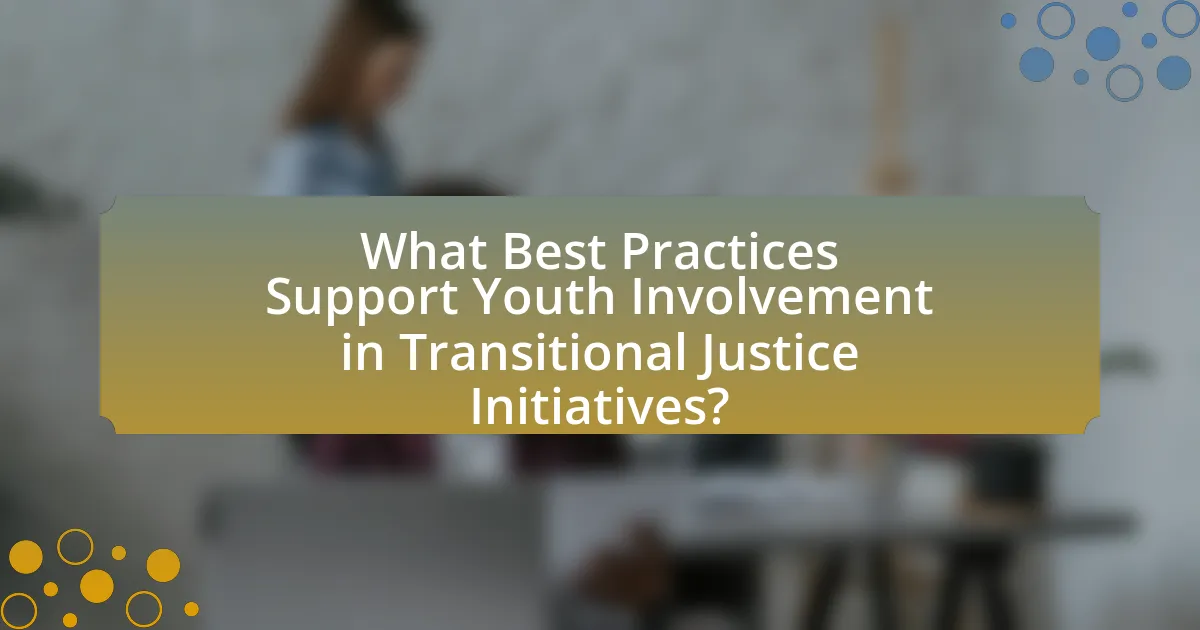
What Best Practices Support Youth Involvement in Transitional Justice Initiatives?
Best practices that support youth involvement in transitional justice initiatives include fostering inclusive participation, providing education and training, and ensuring access to resources. Inclusive participation allows youth to engage meaningfully in decision-making processes, as evidenced by the United Nations Security Council Resolution 2250, which emphasizes the importance of youth in peace and security efforts. Education and training equip young individuals with the necessary skills to contribute effectively, as demonstrated by programs like the Youth Peace Ambassadors initiative, which trains youth leaders in conflict resolution. Access to resources, such as funding and platforms for expression, empowers youth to advocate for their rights and perspectives, as seen in various grassroots movements that have successfully influenced transitional justice policies.
What strategies can organizations implement to engage youth effectively?
Organizations can engage youth effectively by implementing participatory approaches that empower young individuals to take active roles in decision-making processes. These strategies include creating platforms for youth voices, such as forums and workshops, where they can express their opinions and contribute to discussions on transitional justice. Research indicates that youth participation enhances the legitimacy and effectiveness of initiatives, as evidenced by the United Nations’ emphasis on youth engagement in peacebuilding efforts, which has shown that inclusive practices lead to more sustainable outcomes. Additionally, organizations can leverage social media and digital tools to reach and mobilize youth, as studies reveal that young people are highly active online, making these channels vital for engagement.
How can mentorship programs facilitate youth participation in transitional justice?
Mentorship programs can facilitate youth participation in transitional justice by providing guidance, resources, and a platform for young individuals to engage meaningfully in the process. These programs connect experienced mentors with youth, equipping them with the knowledge of transitional justice principles, such as accountability and reconciliation. For instance, research by the United Nations Development Programme highlights that mentorship can enhance youth understanding of their rights and responsibilities, fostering active involvement in justice initiatives. Additionally, mentorship encourages the development of critical thinking and advocacy skills, enabling youth to contribute effectively to dialogues and actions surrounding transitional justice.
What role do educational initiatives play in preparing youth for involvement?
Educational initiatives play a crucial role in preparing youth for involvement by equipping them with the knowledge, skills, and values necessary for active participation in transitional justice processes. These initiatives foster critical thinking, promote awareness of human rights, and encourage civic engagement, which are essential for informed youth involvement. For instance, programs that focus on conflict resolution and restorative justice principles have been shown to enhance youth understanding of justice systems and their roles within them, as evidenced by studies indicating that educated youth are more likely to engage in community activism and advocacy.
What are the key takeaways for fostering youth engagement in transitional justice?
Key takeaways for fostering youth engagement in transitional justice include creating inclusive platforms for dialogue, ensuring access to education about justice processes, and empowering youth through leadership opportunities. Inclusive platforms allow young people to voice their perspectives, which is essential for addressing their unique experiences and needs in post-conflict societies. Education about transitional justice mechanisms equips youth with the knowledge necessary to participate meaningfully, as seen in programs like the United Nations’ Youth, Peace and Security agenda, which emphasizes the importance of informed youth participation. Empowering youth through leadership roles not only enhances their agency but also fosters a sense of ownership over justice processes, as demonstrated by initiatives in countries like Colombia, where youth-led organizations have significantly influenced peacebuilding efforts.
How can stakeholders collaborate to create inclusive environments for youth?
Stakeholders can collaborate to create inclusive environments for youth by establishing partnerships that prioritize youth engagement and representation in decision-making processes. This collaboration can involve local governments, non-profit organizations, educational institutions, and community leaders working together to develop programs that address the specific needs and challenges faced by youth. For instance, research by the United Nations Development Programme highlights that inclusive youth participation in governance leads to better policy outcomes and fosters a sense of belonging among young people. By actively involving youth in discussions and initiatives, stakeholders can ensure that diverse perspectives are considered, ultimately creating environments that are supportive and empowering for all youth.
What ongoing support is necessary to sustain youth involvement in these initiatives?
Ongoing support necessary to sustain youth involvement in transitional justice initiatives includes mentorship programs, funding for youth-led projects, and opportunities for skill development. Mentorship provides guidance and fosters leadership skills, which are crucial for youth engagement. Funding ensures that youth initiatives can be implemented effectively, allowing for sustained participation and impact. Additionally, skill development opportunities, such as workshops and training sessions, equip young individuals with the necessary tools to contribute meaningfully to transitional justice efforts. Research indicates that when these supports are in place, youth are more likely to remain engaged and active in such initiatives, leading to more effective outcomes in transitional justice processes.
